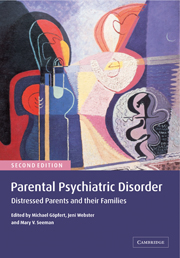Book contents
- Frontmatter
- Contents
- List of contributors
- Foreword
- Preface
- Part I Basic issues
- Part II Comprehensive assessment and treatment
- Part III Specific disorders: the impact on parent–child relationships
- Part IV Specific treatments and service needs
- 16 Psychopharmacology and motherhood
- 17 Social work issues
- 18 Parental psychiatric disorder and the law: the American case
- 19 Parenting and mental illness. Legal frameworks and issues – some international comparisons
- Part V Child-sensitive therapeutic interventions
- Part VI Models for collaborative services and staff training
- Afterword
- Index
- References
18 - Parental psychiatric disorder and the law: the American case
from Part IV - Specific treatments and service needs
Published online by Cambridge University Press: 09 August 2009
- Frontmatter
- Contents
- List of contributors
- Foreword
- Preface
- Part I Basic issues
- Part II Comprehensive assessment and treatment
- Part III Specific disorders: the impact on parent–child relationships
- Part IV Specific treatments and service needs
- 16 Psychopharmacology and motherhood
- 17 Social work issues
- 18 Parental psychiatric disorder and the law: the American case
- 19 Parenting and mental illness. Legal frameworks and issues – some international comparisons
- Part V Child-sensitive therapeutic interventions
- Part VI Models for collaborative services and staff training
- Afterword
- Index
- References
Summary
Introduction
The legal rights of parents with mental illness in the United States vary from state to state. The following chapter examines the current federal and state laws in the United States regarding termination of parental rights, custody and visitation in cases involving a parent with mental illness. The final section of this chapter gives recommendations for attorneys and advocates who are working with mentally ill parents.
Recent studies have indicated that parents who are diagnosed with a mental illness too often lose custody of their children, either to another party or to the state. One study found that 70–80% of parents with mental illness lost custody of their children.1 This added prospect of the loss of custody may also contribute to additional mental health problems for the parent. Many such parents try, unsuccessfully, to navigate a complex and confusing legal system on their own because of their inability to afford counsel. If a parent cannot afford to hire a private attorney or cannot get an attorney from their local legal aid office, typically, they must represent themselves in these very complicated and emotional hearings. It is only in termination of parental rights proceedings that parents are generally granted appointed counsel to be paid for by the state. Without effective counsel, many of these parents will certainly lose custody of their children and may even lose the right to visit their children.
Keywords
- Type
- Chapter
- Information
- Parental Psychiatric DisorderDistressed Parents and their Families, pp. 257 - 270Publisher: Cambridge University PressPrint publication year: 2004
References
- 2
- Cited by

